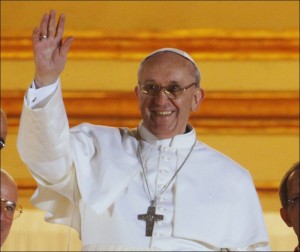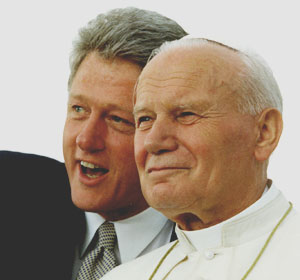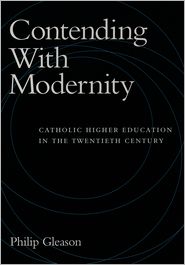 In thinking about yesterday’s election and elevation
In thinking about yesterday’s election and elevation
of Cardinal Jorge Mario Bergoglio to Pope Francis, I’m pretty sure there’s never been a reception study of popes, or a pope, in U.S. intellectual historiography.* I can’t say this with authority, but after a quick search (using Worldcat and Google) I couldn’t find any titles like “John Paul II in America,”** “Americans and Leo XIII,” or “America’s Pius XII” (to add a controversial entry to this fictional list).
Still, I think one could create a series on this topic in relation to Pius XII, John Paul II, John XXIII, Paul VI, Benedict XVI, or even Leo XIII. Each of these Holy Fathers has influenced American politics and thinkers to some extent—some more than others.
For instance, the 265th pontiff, John Paul II, exhibited a sustained interest in America.
 He visited the United States seven times total, the last being in St. Louis in January 1999. During six of his seven visits (one being a brief layover in Alaska) John Paul II met a president. He was the first pope (I think) to visit the White House in October 1979 (during Jimmy Carter’s presidency).*** There were also meetings with Presidents Ronald Reagan, George H.W. Bush, and William J. Clinton. Most historical works on Reagan—at least the ones I’ve read—note that he made a concerted effort to coordinate Cold War anti-communist efforts with John Paul II.
He visited the United States seven times total, the last being in St. Louis in January 1999. During six of his seven visits (one being a brief layover in Alaska) John Paul II met a president. He was the first pope (I think) to visit the White House in October 1979 (during Jimmy Carter’s presidency).*** There were also meetings with Presidents Ronald Reagan, George H.W. Bush, and William J. Clinton. Most historical works on Reagan—at least the ones I’ve read—note that he made a concerted effort to coordinate Cold War anti-communist efforts with John Paul II.
I’m currently reading George Nash’s masterpiece, The Conservative Intellectual Movement in America: Since 1945 (1976, 1996). Therein Nash makes the case that early Cold War conservative intellectuals, Catholic and otherwise, were emboldended by Pope Pius XII’s strong stand against atheistic Communism; he was, in Nash’s words, “uncompromisingly anti-Communist” (p. 114). American Catholics like William F. Buckley, Jr. were inspired by the Church’s teaching to turn anti-Communism into a crusade that both helped and hurt the right.
Several histories of American Catholicism also note the effects of the promotion of Thomas Aquinas’ work in the Church. That began with Pope Leo XIII (in office from 1878-1903), but came to fruition in American universities during Pope Pius XI’s reign (1922-39) according to Philip Gleason in Contending with Modernity
(p. 107). Gleason also rightly points out that the greatest dedication to Aquinas’ teaching came with the founding of Catholic University of America in 1887.
I could go on, but let’s open this up to discussion. Are there any histories (i.e. of Catholicism, intellectual history, or otherwise) that deserve note for their treatment of a pope in America? Which pope apart from John Paul II—let’s make this challenging—has been exceptionally important to American Catholics? Are all of the rest equally influential, or lacking in influence? – TL
———————————————-
* John Cooney’s study of Francis Cardinal Spellman, titled The American Pope, doesn’t count.
* There were a series of talks by JPII published in book form by Charisma Press in 1980 titled Pope John Paul II in America. Those don’t count either.
** Pope Paul VI was the first the visit the U.S. in 1965. Here is a full list of papal visits to the United States.


5 Thoughts on this Post
S-USIH Comment Policy
We ask that those who participate in the discussions generated in the Comments section do so with the same decorum as they would in any other academic setting or context. Since the USIH bloggers write under our real names, we would prefer that our commenters also identify themselves by their real name. As our primary goal is to stimulate and engage in fruitful and productive discussion, ad hominem attacks (personal or professional), unnecessary insults, and/or mean-spiritedness have no place in the USIH Blog’s Comments section. Therefore, we reserve the right to remove any comments that contain any of the above and/or are not intended to further the discussion of the topic of the post. We welcome suggestions for corrections to any of our posts. As the official blog of the Society of US Intellectual History, we hope to foster a diverse community of scholars and readers who engage with one another in discussions of US intellectual history, broadly understood.
Come on! Where’s John XXIII? He might not be the exact subject of numerous books about Vatican II in America (how about Colleen McDannell’s The Spirit of Vatican II? Or an older article like Bianchi’s “John XXIII, Vatican II and American Catholicism,” and the recent spat of books about Vatican II in America), but without John XXIII those books don’t happen. Before then, chronologically speaking, guys like Pius XI and Pius XII maybe would have had their pictures up in working-class Catholic homes, those being the confident days of the American Church, but this isn’t often the subject of intellectual histories. Anyway, my sense is that, like many of those before him–Benedict XVI, John Paul II, Paul VI especially–Francis I will be irrelevant to the direction and fate of American Catholicism, and that the slow seep, sustained numerically only by immigration, will continue amidst the perpetual moral rot of the priesthood. Not to be a downer or anything…but it is in the demographics.
I do mention John XXIII in paragraph two, though I did forget to create a tag for him. That aside, you’re totally right that he was an esteemed figure in America—though I don’t know if that esteem was bestowed before, during, or after VCII. Otherwise, thanks for the Bianchi reference. That’s precisely what I was looking for. Speaking of articles, I’m guessing that the answer to my “Where’s the beef?”-type question is in journals like *American Catholic Studies*, the *U.S. Catholic Historian*, and the *Catholic Historical Review*. I confess that my off-handed lit review was about books alone. Still, it seems that I may have found a series for Notre Dame Press to tackle.
One article I read speculated that the election of Pope Francis may (no stronger verb) help stem the exodus of Hispanics from Catholicism to Protestantism. I’ll believe that when I see it.
Still, Kevin, don’t you think it’s high time for book-length historical reception studies on popes? Looks like there’s plenty of food for thought—even if the reception study was confined to one book and post-WWII popes. – TL
And now my pre-Vatican II brain just kicked on. How about the various appearances of papal dictates–especially ultramontanism–that appear in John McGreevey’s Catholicism and American Freedom? To your point, though, it is striking that I don’t remember a pope appearing in a stellar book about Catholic thought (in part about it anyway) in Edward Purcell’s magnificent Crisis of Democratic Theory.
I wish I could talk more about Purcell’s book, but sadly I haven’t read it (meaning closely).
sustained numerically only by immigration
OTOH, Kevin, the Roman Church’s numbers in America were always bolstered by immigration. Now it’s Latin America instead of Ireland and Italy.
amidst the perpetual moral rot of the priesthood
Ouch. Tell us what you REALLY think. ;-O